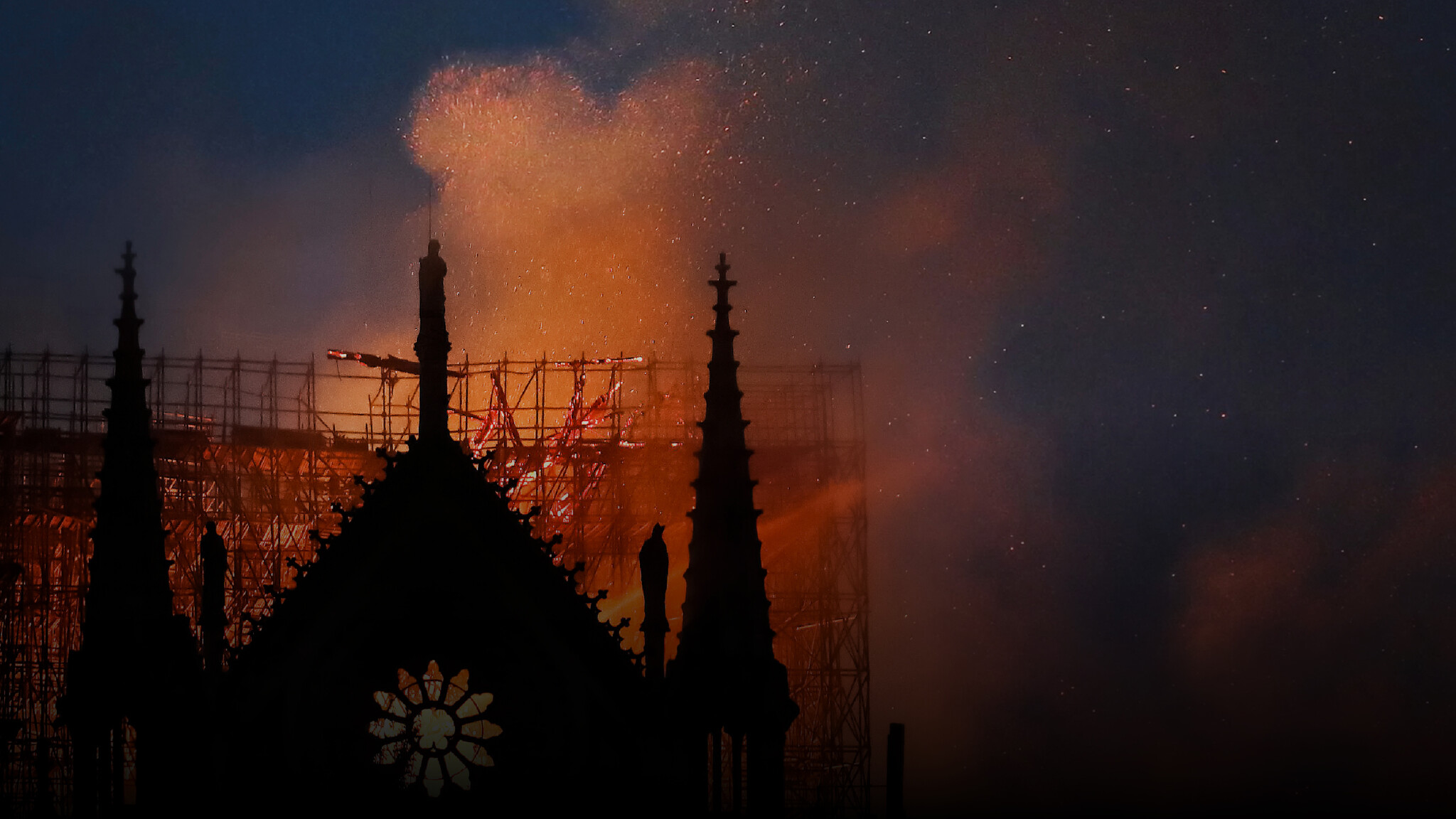What I find maddening these days is how little attention is given to the attacks on the Christian world. A world that, I must admit, has not always been kind to “my people”. And yet, a world that has, over centuries, undergone profound reform. That has contributed to our foundation of Enlightenment, civilization, and the evolutionary unfolding of our societies. It’s time we pause to confront what’s happening at the moment. Not superficially with a couple of sentences, but deeply.
In the aftermath of the devastating attack on the Mar Elias Church in Damascus, where at least twenty-five Christians were murdered, we mustn’t only mourn and listen. Yet we seem incapable of even doing that. As a collective, we avert our eyes from what this means for our outward life, thus for our societies. I’ll never rationalize these attacks with excuses like “payback” or “the Christian world was once bad to my people”. That logic is void of ethics.
We aren’t just dealing with explosions and attacks on buildings. This is about the impact on our inner lives as well. Look at the shattered stained-glass windows of churches as mirrors, reflecting our cracks. These aren’t mere attacks on a religion, but the moral implosion of world order. In the ruins of the liturgy lies a form of calling, not to martyrdom, but to profound introspection.
Enjoy independent, ad-free journalism - delivered to your inbox each week
Dismantle a cultural timeline to render what was once lived unspeakable
Valentin Mudimbe once wrote that man is crushed by his history. In these events, violence is no longer merely directed at bodies, but at the intangible such as memory, language, faith, and the very notion of future. The attack in Syria isn’t some impulsive act of rage or primal outburst. It’s a deliberate, coordinated act of historical vandalism. Literally. (Copyright: as always, the AI-powered capacity of Dina-Perla’s mind.)
It seeks to dismantle a cultural timeline to render what was once lived unspeakable. That requires a global response. Not only through policies and diplomatic jargon beyond our grasp, but through conscience and our shared humanity.
The meaning of terror lies in the uncomfortable responsibility it places on us. Who are we, that we only recognize another’s suffering when the media amplify it? How deep does our humanity run, if it depends entirely on where the cameras point? Or on how “close” the victims are to us, emotionally or ideologically?
Erasure of a people’s very right to exist
We aren’t witnessing isolated incidents of anti-Christian violence. A pattern has long been emerging, spreading geographically and rooting itself ideologically. In early 2025, the Kasanga massacre in North Kivu, Congo claimed over seventy Christian lives; beheaded systematically, with ritual precision. The message is clear: faith is an enemy when it isn’t the “correct” faith.
In Burkina Faso, entire Christian villages — some centuries old — have been wiped off the map. Refugee camps are filled with families who lost fathers to machetes and watched their sanctuaries burn. I repeat: these aren’t retaliatory attacks or tragic coincidences. They’re part of an ideological cleansing. Not strictly religious in the dogmatic sense, but existential. Their goal is the erasure of a people’s very right to exist.
And if there are reactions at all, they are largely symbolic. Such as candlelight vigils, digital sympathy, and the occasional tweet from a head of state. But gestures are no substitute for justice. What we need, at the very least, is solidarity that goes beyond empathy. Solidarity that becomes infrastructure, protection, and enforced international safeguards. Solidarity as a recognition of shared fate.
We don’t live beside them, we live with them. In the same world, ethical space, and era. Their prayer may not be ours, but their fear is our human right! Their death is our failure. Let’s be clear: these victims didn’t elect terrorist leaders or choose infernal ideologies. There’s no such thing as “they had it coming”.
Fear of meaninglessness
Terrorism’s most underestimated weapon is fear. Not because it kills, but because it normalizes what must never be normalized. Fear makes us obedient; violence becomes expected. When we begin to anticipate attacks, we lose our moral capacity for outrage.
Philosopher Emmanuel Falque, whose name rarely escapes theological circles, argued that humanity only becomes truly ethical in the face of unthinkable suffering that cannot be narrated, and that disorients language itself. It’s precisely in the face of that dissonance that we must act.
The fear now alive in Syria and Congo isn’t fear of death alone. It’s fear of meaninglessness. Fear that their deaths will go unnoticed. That their faith will be forgotten. (For now, I believe it won’t be, but decades from now? I’m not so sure.) That fear reflects our indifference. Every time we stay silent after a church bombing, our ethics grow thinner and our humanity weaker.
This fear transcends religion. It touches on the very possibility of coexistence. If religious minorities cannot be protected in peacetime, what do citizenship, protection, and democracy even mean?
Faith isn’t a balloon
Despite unspeakable loss, Christian churches continue to endure. In Syria alone, over a million Christians have fled since the civil war began. What remains is a fragmented and traumatized minority. And yet they persist in their faith.
The Pakistani poet Fahmida Riaz once wrote that faith isn’t a balloon that bursts at the slightest prick, but a rock: rooted, heavy, and indestructible (quoted loosely, if you’ll allow). Whether we share that faith or not, it deserves our respect, not just for what it proclaims, but for what it endures.
In North Kivu, survivors gathered the next day for a service. No accusations and hatred. Just grief, shared and transformed through prayer. That isn’t naivety. That’s victory. The ability to hope, when revenge would be the easier way out.
Faith that endures isn’t ideology; it’s raison d’être. Pure divinity. A refusal to vanish, even when being reduced to shadow. This isn’t a Christian privilege (blind sense of superiority); it’s a universal example of spiritual defiance.
Idea of coexistence without conformity
Terror against religious minorities is more than physical destruction. It’s symbolic warfare against plurality itself. The idea that people can coexist with differing truths without exterminating one another. When a church is blown up, so too is the idea of coexistence without conformity.
The gravity of these attacks is not local; it’s civilizational. They’re a symptom of our failure to protect plurality. Instead of defending freedom as a universal value, we indulge in geopolitical convenience. We support regimes that crush minorities, as long as trade routes stay open.
But plurality is no footnote. It’s the heart of civilization! It tolerates no conditionality. James Baldwin said there’s no neutrality in the face of injustice. We’re either complicit, or we break the silence. There’s no middle ground. Today, with bombed churches and displaced communities, we stand exactly at that crossroads.
Every person has the right to meaning and existence
The world isn’t a patchwork of nations but a web of vulnerabilities. We’re bound together by pain and possibility. When we speak of the persecution of Christians, we mustn’t do so for political gain, but out of human solidarity. Out of the conviction that every person has the right to meaning and existence.
The Christians in Syria, Congo, and Burkina Faso aren’t asking for power. They’re asking for existence. Their cry demands that we reassess our values. What does selective freedom mean, if it’s a ticking time bomb? What’s security, if it isn’t universal?
Let us rediscover our faith in others as a moral foundation. Let us remember that every act of terror against churches, synagogues, mosques, or temples diminishes something irreplaceable in us all.
The problem isn’t capacity, it’s priority
If we recognize these attacks not as isolated tragedies, but as tears in the moral fabric of the world, we must act accordingly. The international community has the tools but lacks will. We need what I’ll call a Moral NATO: an ethical alliance where these attacks are seen not as internal affairs but as global breaches of conscience.
The UN Security Council could establish a permanent observatory for religious minorities in conflict zones. Persecution reports must become mandatory in peace negotiations. Humanitarian aid must be tied to explicit religious freedom benchmarks. Attacks on places of worship must be prosecuted as cultural genocide by the International Criminal Court.
Diplomacy shouldn’t merely respond to rubble. It must anticipate the rustle. Early warnings should be treated seriously. Local religious leaders must become formal partners. Ambassadors must be trained in religious-cultural literacy. A well-placed protection unit, fast international condemnation, or a credible threat of sanction can save lives. The problem isn’t capacity; it’s priority.
Even theology can be blind to its privilege
Western churches and theological institutions must do more than offer distant prayers. True solidarity is both theological and logistical. This means building real partnerships with persecuted communities, not as benefactors, but as equals. It means financial support, medical aid, and liturgical exchange. The persecuted church can renew our spiritual depth.
These persecutions occur where faith intersects with geopolitical trauma. That’s why Christian networks mustn’t respond with missionary zeal, but with listening hearts. Even theology can be blind to its privilege. The vulnerability of a Syrian Christian, Congolese altar boy, or Burkinabe catechist is a mirror to our delays, absences, and late-spoken words.

Perseverance purer than any theology of comfort
Theological questions raised by these attacks are rarely spoken. Because to name something is already to indict it. What’s faith worth, when it’s systematically obliterated? What remains of God when godliness becomes the target?
The persecuted churches don’t reduce faith to insurance or strategy. They offer a provocative challenge to churches in safer regions. Can we build a theology not around triumph, but around vulnerability? A God not as ruler or rewarder, but as witness and co-sufferer?
We must learn from the underground churches of Aleppo, the clandestine services in Nigeria, and fractured hymns of Kasanga. In them lives spirituality, courage, and perseverance purer than any theology of comfort. A theology with nothing left but fidelity, hope, and God’s co-suffering.
Theology mustn’t explain here. It must accompany. For the mystery is not only why evil exists. It’s why people keep loving, hoping, and believing in spite of it. These people are our example. Not just because they hint at our future, but because they remind us of all that’s still possible in the abyss.
Let it be said again. The severity of the attacks on Christian communities is no marginal issue. It’s a fundamental test of the values we claim to uphold. These attacks expose whether our solidarity is real or seasonal. Whether our belief in human rights is principle or performance. Whether our theology can endure suffering.
There’s still time to act but not much. Every day a church burns, something of our collective conscience goes up in smoke. One day, we’ll ask why no one tried to douse the flames. Why a world of bonfires turned into ashes. Let us not wait for that day. The time to stand up is now.




Comments (0)
Only supporting or founding members can comment on our articles.